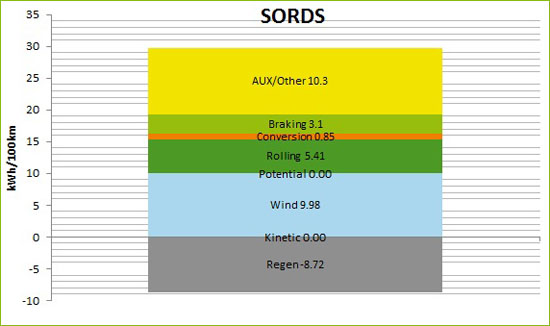Using regenerative braking
An electric motor can also be used as an electric brake. Traditional automobile brakes rely on friction which only wastes energy. Electric regenerative braking conserves much more energy which in the end helps saving fuel.
Watch this video to learn about regenerative braking:

Regenerative braking has actually been used on Formula One cars. It was designated the KERS system as in Kinetic Energy Recovery System. The system is slowly becoming available on hybrid cars for the road. A similar and very effective system is built in every electric car you can buy today.
Remember to always brake gently!
The huge impact on energy consumption from the regenerative braking is shown on Figure 2 - grey area. This is the energy that is recuperated during gentle braking or coasting without depressing the accelerator pedal. Only EV's and hybrids have the ability to recapture energy like this and the benefit is enormous. If the EV shown in Figure below could not regenerate, the consumption would be 30% higher.

Figure: Showing the impact of regenarating brakes.
Different EVs have different regeneration capabilities. Regeneration however is never as powerful as mechanical braking. It will not bring the vehicle to a sudden halt but merely slow the vehicle in a smooth and controllable manor. Learn the optimum braking strategy by noting the information on the dashboard and try not to activate the mechanical brakes at speeds above 10 km/h.
Modern cars are all equipped with anti-lock brakes and electronic stability programs. This goes for EV's as well. Therefore, you should not fear the regenerative braking system even on slippery surfaces such as driving on winter roads. The car will not brake autonomously if there is a risk of skidding.
Regenerative braking works seamlessly in most circumstances. However, if the battery is fully charged it may not be able to capture all the energy from braking. Therefore, the regenerative function may be reduced the first couple of minutes after recharging.
